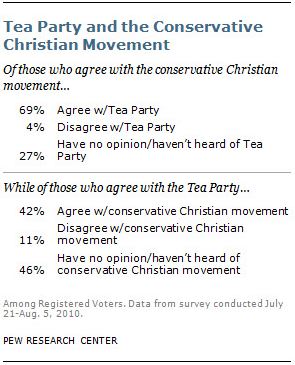
The US government has been officially closed for business for about two weeks now. The clown show going on in DC has made us the laughing stock of the world and cheered up our enemies. Worse, there could be more to come: the fight over the US Debt Ceiling might cause our treasury to go into default for the first time ever. But while all this is supposed to be over funding the Affordable Care Act (aka Obamacare), there may be other factors involved as well. On this blog, I have discussed the role played by religion where it is generally ignored. Maybe religion has a part to play here, too?
To begin with, the public generally agrees that the shutdown is to be blamed on the Republicans (and specifically the Tea Party). Even the business community can see this, and is concerned about its impact on the economy. So if the Tea Party is all about a small government and furthering the interests of the private sector, why are they so entrenched in their position?
Enter the religion factor. According to Salon.com,
The press often talks about the Tea Party like they’re secularist movement that is interested mainly in promoting “fiscal conservatism”, a vague notion that never actually seems to make good on the promise to save taxpayer money. The reality is much different: The Tea Party is actually driven primarily by fundamentalist Christians whose penchant for magical thinking and belief that they’re being guided by divine forces makes it tough for them to see the real world as it is.
It’s no surprise, under the circumstances, that a movement controlled by fundamentalist Christians would be oblivious to the very real dangers that their actions present. Fundamentalist religion is extremely good at convincing its followers to be more afraid of imaginary threats than real ones, and to engage in downright magical thinking about the possibility that their own choices could work out very badly. When you believe that forcing the government into default in an attempt to derail Obamacare is the Lord’s work, it’s very difficult for you to see that it could have very real, negative effects.
The Christian right media has been hammering home the message that Christians should oppose the Affordable Care Act. Pat Necerato of the Christian News Network accused the supporters of the law of committing idolatry and accused people who want health care of being covetous. The Christian Post approvingly reported various Christian leaders, including Tony Perkins of the Family Research Council, saying things like the health care law is “a profound attack on our liberties” and lamented “Today is the day I will tell my grandchildren about when they ask me what happened to freedom in America.”
In other words, the Christian right has worked itself into a frenzy of believing that if this health care law is implemented fully, then we are, in fact, facing down either the end of American Christianity itself or quite possibly the end times themselves. In comparison, it’s hard to be too scared by the worldwide financial collapse that they’re promising to unleash if the Democrats don’t just give up their power and let Republicans do what they want. Sure, crashing stock markets, soaring unemployment, and worldwide economic depression sounds bad, but for the Christian right, the alternative is fire and brimstone and God unleashing all sorts of hell on the world.
Well this thesis sounds plausible. After all, prominent Tea Party politicians have used religious language to justify their opposition to federal programs, denied the existence of separation of church and state, and have come out in favor of specific church/state entanglements, and hence their acting out of a religion-based ideology would not be far fetched. Do data support the idea of the Tea Party being in close alliance with the Christian Right?
To some extent. The Salon article links to a poll from Pew that dates to 2010. While the numbers may no longer be somehow outdated, some of the findings are quite intriguing.

In other words, while a clear majority of Religious Right is supportive of the Tea Party, the reverse is not necessarily the case. More recently, interviews with evangelical republicans and Tea Party supporters have shown a similar pattern: evangelicals see themselves as a besieged minority, and cheer on the Tea Party for coming out against the people they see as their tormentors. The Tea Party, on the other hands, is not necessarily so concerned with issues that are of prime importance to evangelicals.
Hence evidence indicates that they are at least partially motivated by religion, but this explanation in unlikely to explain their irresponsible and erratic behavior in its entirety. What other motives do they have?
Well, let us ask the late Christopher Hitchens.
